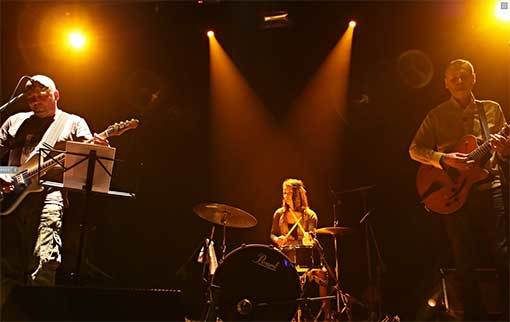Memory? Honour? Its revival? The best answer to the question of what Dunajská vlna actually is, is the first four bars of their debut album, Jednou. First they were joined by older colleagues Vladimír Václavek and Josef Ostřanský; now the space is reigned over by a young drummer Michaela Antalová. New blood, new energy and a promise that Dunajská vlna is not, and will not be, a mere copy of the legendary Dunaj.
There are signs of changes encountered with the greatest hits of the "greatest of Brno's bands". Without wanting to argue with fans who continue to listen to Rosol or Dudlay, for a contemporary listener, the 2015 versions are more legible and, surprisingly, sometimes even more raw.
We know the saying about entering the same river twice. It is therefore a good thing that Vladimír Václavek and Josef Ostřanský decided not to continue with what used to be under the name Dunaj, but instead they came up with a new name for their new band which, however, very clearly indicates continuity. Dunaj, as such, cannot be renewed – without lead singer Jiří Kolšovský, who died of a heart attack at the age of 43, that would not be right. Of the four members remaining from Dunaj’s last composition, drummer Pavel Koudelka is missing as he is currently busy with the band Mňága a Žďorp. In addition, the Brno superband (which is a term that is used for bands composed of musicians active in other projects) is associated with names like Iva Bittová and Pavel Fajt, without whom Dunaj would have hardly gotten established in the late 1980s. Dunaj, therefore, remains a glorious past but "times change and darkly compelling songs re-emerged as Dunajská vlna", as it says on the band's website.
On the album Jednou, Dunajská vlna returns to all five of Dunaj’s albums. Each choice is obviously subjective but I personally feel that they managed to choose and carry out really the most important parts. My favourite songs by Dunaj are Na jih, Wahoo, Barvy and Cassiniho dělení, followed by Kobylky and My Dream. None of them are missing. They also managed to capture a whole range of moods that characterised the former band – from the minimalist folk Cassiniho dělení to the more energetic Jednou or Why Cannot. And because – let's remind ourselves again – you cannot enter the Danube River twice, the new versions maintain the mood and the essence of the originals but, at the same time, they reflect the efficient selection of members of Dunajská vlna and, naturally, also the experience gained by Václavek and Ostřanský over the nearly twenty years since the end of Dunaj.
Development is most evident with Vladimír Václavek, who has recorded several major solo albums in the meantime. Even on those, he operated across a wide range in terms of arrangements and performance dynamics; however, his songs still form a quiet counterpoint to the nervy music of the original Dunaj. In Dunajská vlna, he returns to his rocker essence, but his singing, even in more energetic passages, radiates inner peace and serenity, which is outwardly reflected in greater clarity. However, the overall sound of the band is – compared to the original recordings of Dunaj – clearer. This is due, of course, to the composition itself, because Dunaj did not use to play with only three people. It is important, however, that none of the current members of the band has a tendency to unnecessarily show off and fill space more than is healthy. At the same time, even with the basic rock line-up, with a guitar, bass, and drums, they manage to stir up as much energy as the songs need. The playing style of Dunajská vlna is very rhythmic (listen to the new version of the song Na jih), or it works with distinctive rhythmical figures (Nekňuba). Michaela Antalová, a graduate of the Higher Vocational School at the Conservatory of Jaroslav Ježek, brings a new playing style to the band that is obviously different from the drumming of both of its predecessors, the giants of the Brno scene Pavel Fajt and Pavel Koudelka. For a clearer idea of Michaela's "teaching" and yet still youthful energetic approach, I recommend listening to the song Tak se neboj, with the jazz play, or the introductory Prší, in which the drums are fuller and fiercer than in the original version.
Of course, Dunajská vlna and their debut album will be approached differently by the fans of Dunaj (even here it may be due to distrust, just like the enthusiasm for their "return"), as well as by those who are not familiar with the former Brno alternative scene and for whom it is completely new material. Vladimír Václavek and Josef Ostřanský, since they decided to enter the river in a new area, did what was necessary. They brushed up those songs that did not deserve being covered in dust. However, it will not be possible to put together another, equally strong, "Best of Dunaj", so we have to wait for new songs which – according to a statement by the band – "are on the way". When these have been created and released, it will show to what extent Dunajská vlna is a full-fledged band and to what extent it is just a reminder of a legend. I, personally, would like to see the album Jednou to have a meaningful following.
Dunajská vlna: Jednou, publisher: Polí5 2015. 15 tracks. Total time: 53:12































